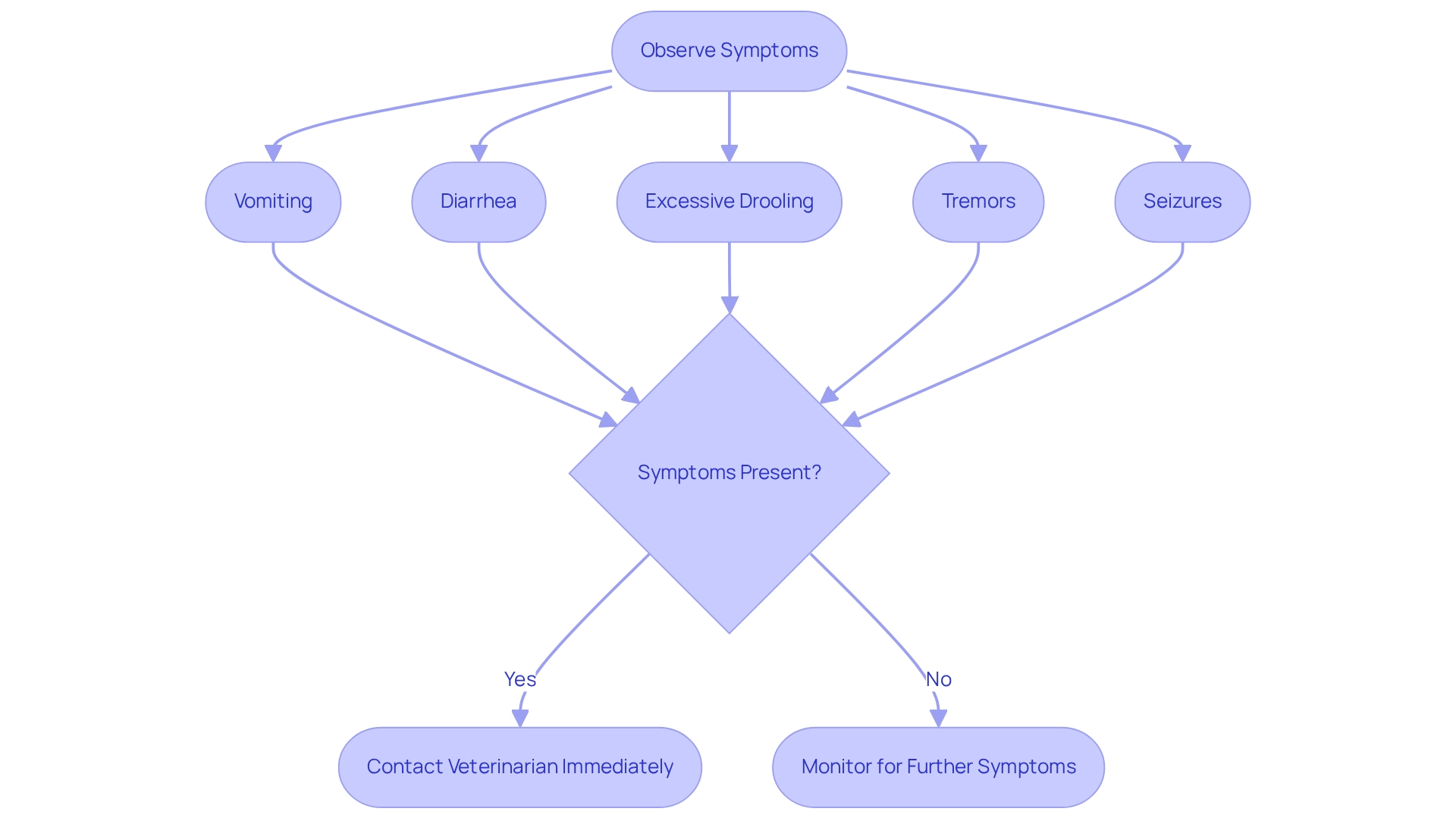Can Dogs Eat Walnuts? Essential Steps for Safe Introduction
Overview
As a loving pet owner, it’s crucial to be aware that dogs should not eat walnuts due to the significant health risks they pose. These include:
- Pancreatitis
- Choking hazards
- Potential toxicity from moldy nuts
We understand how much you care for your furry family members, and that’s why it’s so important to consult a veterinarian before introducing any new foods, especially walnuts.
At Adventure Den, we emphasize the need for safe introduction of new foods and monitoring for any adverse reactions. Your pet’s health is our top priority, and we want to highlight the serious consequences that walnut consumption can have on dogs. By staying informed and seeking professional advice, you can ensure a nurturing environment for your beloved companions.
Introduction
In the world of pet care, the choices you make regarding your furry family members’ diets can profoundly impact their health and well-being. Among the many foods you might consider, walnuts emerge as a particularly risky option. While these nuts are celebrated for their nutritional benefits for humans, they can pose serious dangers for dogs, especially for puppies whose developing systems are more vulnerable. The potential risks associated with walnut consumption range from severe health conditions like pancreatitis to hidden threats from moldy varieties. Understanding these risks is crucial for responsible pet ownership.
This article explores the various aspects of walnut toxicity in dogs, offering valuable insights on safe dietary practices. We emphasize the importance of consulting veterinarians and recognizing the alarming symptoms of walnut-related health issues. By nurturing a safe environment for your beloved pets, you can help ensure their health and happiness.
Understand the Risks of Walnuts for Dogs
Nuts, particularly black varieties, can pose serious health risks for our beloved canine companions, raising the concern of can dogs eat walnuts, especially for young pups whose developing systems are particularly vulnerable. It’s important to keep these nuts away from their diet, as they can lead to severe health issues like pancreatitis—an inflammation of the pancreas that can be life-threatening, which raises the question: can dogs eat walnuts? This connection between nut consumption and pancreatitis underscores the need for pet guardians to be vigilant. Furthermore, it is important to consider if can dogs eat walnuts, as these nuts can present a choking hazard, particularly for smaller breeds, making it essential to exclude them from your dog’s meals.
Moldy nuts are particularly dangerous, as they may harbor mycotoxins that can harm your furry family members, leading to symptoms such as vomiting, tremors, and seizures. A case study on health complications related to nut consumption reveals various issues, including obesity and digestive problems, reinforcing the guidance against feeding these to pets. As Nandini Maharaj wisely points out, “It’s crucial to ask, can dogs eat walnuts, especially since salted walnuts or those with seasonings like onion and garlic can be toxic for them.” Given these risks, it’s crucial to consult with a veterinarian before introducing any new foods into your dog’s diet, particularly to ask if can dogs eat walnuts, which are known to be potentially harmful. Monitoring your dog’s condition after consuming such items is vital for early diagnosis and intervention.
Additionally, consider the peace of mind that pet insurance, such as Pumpkin Pet Insurance, can offer for unexpected accidents or illnesses. By being proactive and informed, you can ensure a nurturing environment for your furry family members.
Evaluate Your Dog’s Health and Dietary Needs
Before deciding if can dogs eat walnuts as a snack, it’s essential to consider your furry family member’s overall condition. Factors such as age, weight, and any pre-existing medical conditions—like pancreatitis or allergies—are crucial to assess. Did you know that a significant percentage of canines face health issues that can impact their diet? This makes it vital to consult your veterinarian to determine if your beloved pet is at risk for negative reactions, especially when considering if can dogs eat walnuts.
Experts suggest that dogs with a history of gastrointestinal problems may need to avoid nuts entirely, leading to concerns about whether can dogs eat walnuts. Additionally, take a moment to evaluate your dog’s current diet to ensure that adding these nuts supports their nutritional needs without causing any imbalances.
Real-life experiences from Adventure Den highlight the importance of thorough dietary evaluations for dogs with health concerns, underscoring the necessity of discussing your dog’s nutritional requirements with a veterinarian before introducing new foods like nuts.

Introduce Walnuts Safely: Guidelines and Precautions
When considering the addition of nuts to your dog’s diet, it’s important to take a gradual approach. Begin with a very small portion, like a quarter of a nut, and observe your furry friend closely for any negative reactions over the next 24 hours. Keep an eye out for signs of gastrointestinal distress, such as vomiting or diarrhea. If your dog handles this small amount well, you can slowly increase the quantity, but always keep it minimal. Remember, these nuts should not replace a balanced diet; they are best enjoyed as an occasional treat.
Make sure the nuts are fresh and free from mold, as moldy nuts can pose serious health risks. Veterinary guidance emphasizes that introducing new items, like nuts, should be done with care. By following these guidelines, you can safely determine if dogs can eat walnuts and incorporate them into your dog’s diet while adhering to best practices for introducing any new food. This thoughtful approach can lead to higher success rates in dietary transitions. Studies have shown significant correlations between dietary changes and beneficial microbial profiles in dogs, particularly illustrated in the case study titled “Correlation Between Differential Metabolites and Microbiota.”
By prioritizing your pet’s welfare, you can make informed decisions about their nutrition. As Krista shared about her dog Radar, who has allergies, monitoring for any adverse reactions is crucial when introducing new items. Furthermore, with 50 metabolites identified in the AC group, it’s evident that dietary changes can significantly impact a dog’s microbiome. This highlights the need for transparency and better options in the dog food industry, ensuring the health and nutrition of your beloved pets.
Recognize Symptoms of Walnut Toxicity and Respond Appropriately
It’s important to be vigilant for signs of nut toxicity in your furry family members, as early detection is vital. Symptoms may manifest as:
- Vomiting
- Diarrhea
- Excessive drooling
- Tremors
- Seizures
As Kiersten Rankel wisely notes, “These are the red flags that your dog’s casual nibble has turned into a full-blown emergency.” If your dog shows any of these signs after eating nuts, it is crucial to reach out to your veterinarian promptly.
Taking swift action is essential, especially if your dog has consumed a significant amount or spoiled nuts, which can worsen the situation. In severe cases, nut toxicity may lead to neurological symptoms or even fatal outcomes. Continuous contact with black juglone can cause a gradual buildup of this compound in a dog’s body, potentially leading to lasting problems that impact the heart and nervous system. Therefore, acting quickly and seeking professional help is key to ensuring your pet’s health and safety.
Remember, while peanuts, cashews, pecans, pistachios, and almonds are safe nuts for dogs to eat occasionally, it is important to ask, can dogs eat walnuts, as they pose significant risks that require immediate attention. Your pet deserves a nurturing environment, and being informed is the first step in safeguarding their well-being.

Conclusion
Understanding the risks associated with walnut consumption is vital for the health and safety of your furry family members, particularly puppies whose systems are still developing. Walnuts, especially black walnuts, can lead to severe health issues such as pancreatitis and pose choking hazards. Moreover, the danger of moldy walnuts, which can contain toxic mycotoxins, underscores the need for vigilance among pet owners. Consulting with a veterinarian before introducing any new food into your dog’s diet is essential to mitigate these risks and ensure a safe feeding experience.
Evaluating your dog’s overall health and dietary needs before considering walnuts is crucial. Factors such as age, weight, and pre-existing health conditions must be taken into account. Expert advice stresses that dogs with a history of gastrointestinal issues should avoid walnuts altogether. A careful assessment of your dog’s diet can help prevent nutritional imbalances and guide safe food choices.
When introducing walnuts, a gradual approach is recommended. Starting with a small portion and monitoring for adverse reactions can help ensure safety. Remember, walnuts should only serve as occasional treats and should not replace a balanced diet. By adhering to these guidelines, you can make informed decisions that prioritize your dog’s well-being.
Lastly, recognizing symptoms of walnut toxicity is critical for prompt intervention. Signs such as vomiting, diarrhea, and tremors should not be overlooked, as they may indicate a serious health crisis. Immediate veterinary attention can make a significant difference in outcomes, especially in severe cases. By remaining informed and cautious, you can protect your furry companions from the dangers of walnuts and promote a healthier lifestyle.
Frequently Asked Questions
Can dogs eat walnuts?
No, dogs should not eat walnuts, especially black varieties, as they can pose serious health risks, including pancreatitis.
What health issues can walnuts cause in dogs?
Walnuts can lead to severe health issues such as pancreatitis, which is inflammation of the pancreas and can be life-threatening. They can also present a choking hazard, particularly for smaller breeds.
Are moldy walnuts dangerous for dogs?
Yes, moldy walnuts are particularly dangerous as they may contain mycotoxins that can cause symptoms such as vomiting, tremors, and seizures in dogs.
What should I do if my dog consumes walnuts?
It is crucial to monitor your dog’s condition after consuming walnuts and consult with a veterinarian for early diagnosis and intervention if any adverse symptoms arise.
Can seasoned or salted walnuts be harmful to dogs?
Yes, salted walnuts or those seasoned with ingredients like onion and garlic can be toxic to dogs and should be avoided.
Should I consult a veterinarian before introducing new foods to my dog’s diet?
Yes, it is important to consult with a veterinarian before introducing any new foods, particularly to ask about the safety of walnuts for dogs.
What can pet insurance provide in relation to dog health issues?
Pet insurance, such as Pumpkin Pet Insurance, can offer peace of mind for unexpected accidents or illnesses related to your dog’s health.







